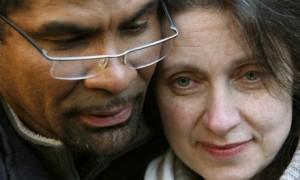No Assisted Suicide Charge for Son of Sir Edward Downes
BBC News (March 19, 2010)
My very first post for the Death Reference Desk occurred on July 15, 2009 and it discussed the deaths of Edward and Joan Downes. The Downes’ went to the Dignitas Clinic in Switzerland to die together, their’s is a common story in the UK. Indeed, the stories about UK residents going to the Dignitas clinic remain an almost weekly occurrence.
What is new about the Downes’ case is that the Director of Public Prosecutions in the UK (Keir Starmer) has decided to not charge either of the Downes’ children with assisting their parents to die. I have discussed at length how suicide in the UK is legal but assisting a person to die is not. The Death Ref section on the Death + The Law presents these cases. Today’s legal decision is also important because it is the first time that the new guidelines drawn up by Keir Starmer have found no public interest in prosecuting a family member who clearly acted on compassionate grounds.
I am including a news clip from last July about Joan and Edward Downes. It’s interesting to note what has and hasn’t changed since then.

